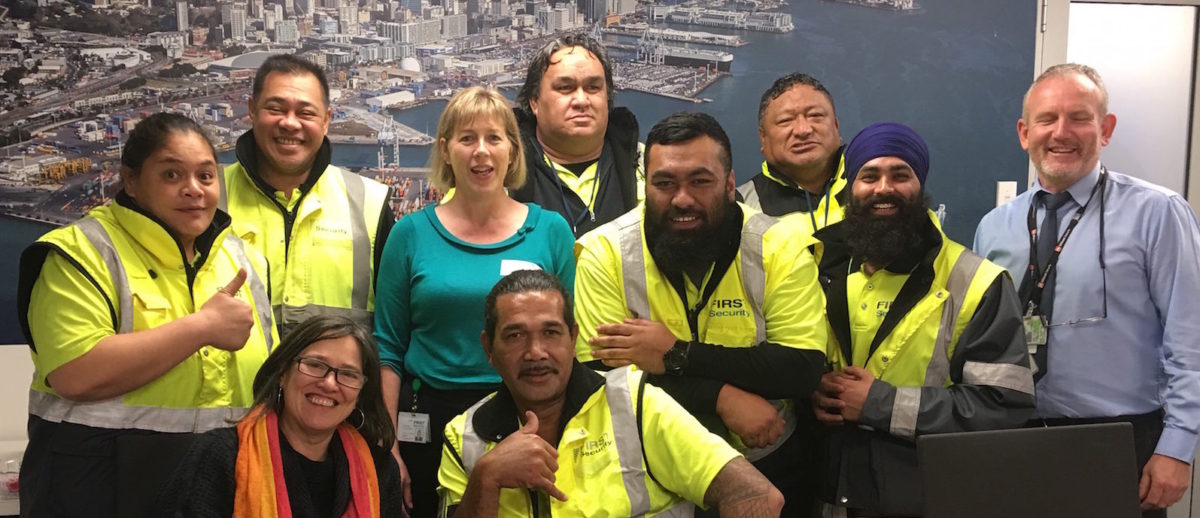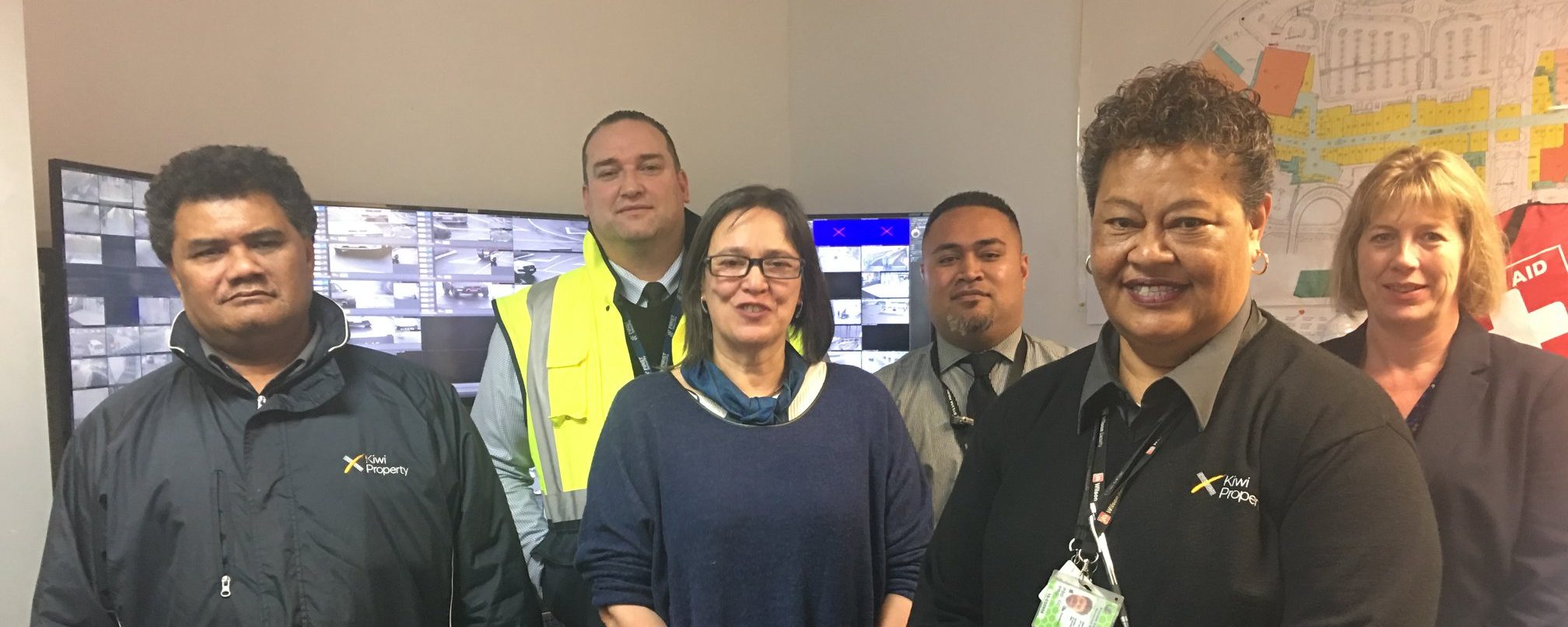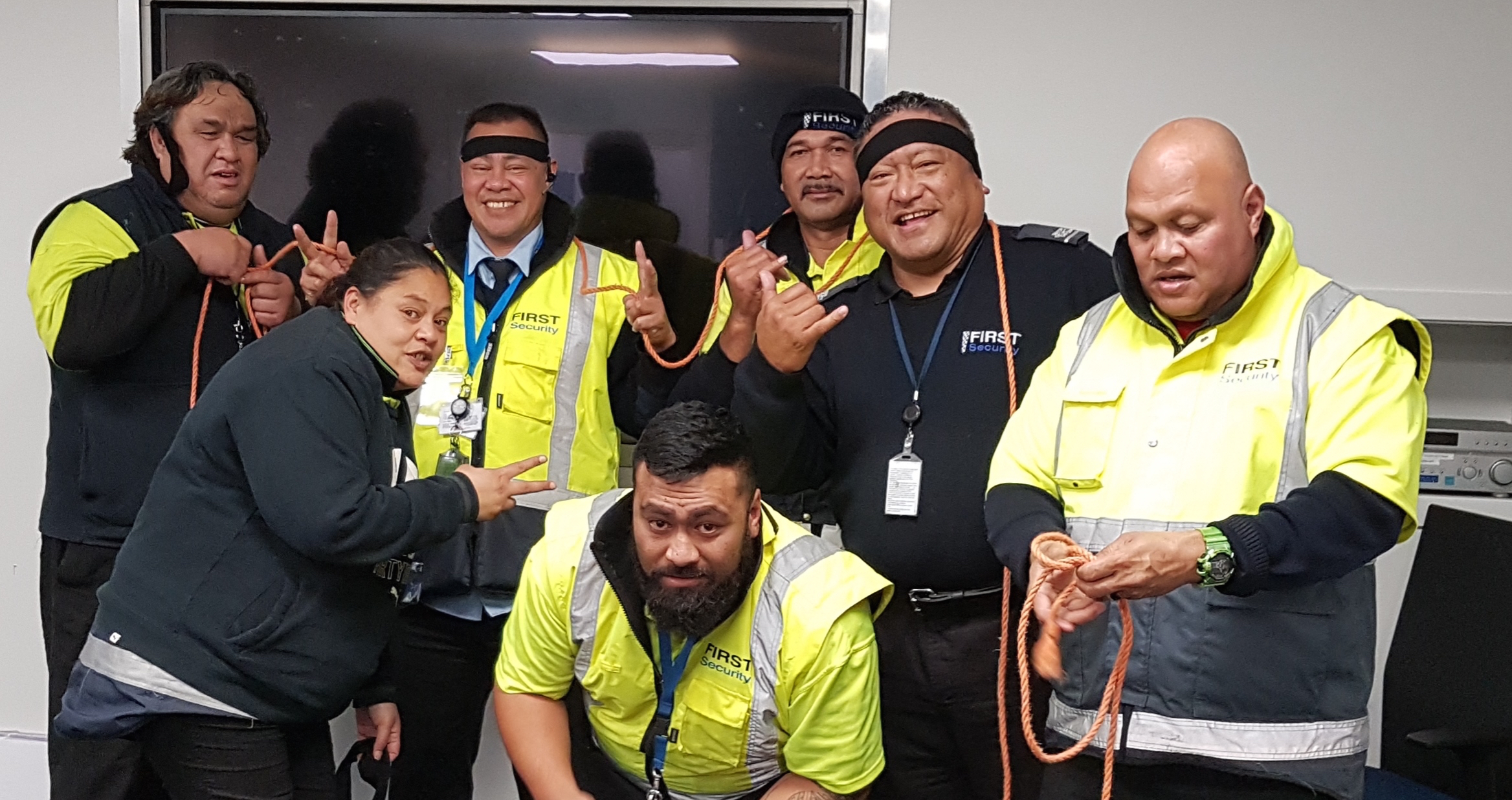A big vision
Effective communicators, collaborative teams and concise report writers were at the heart of First Security’s goals for its literacy policy when it launched in 2005. A straightforward document with a big vision, it was the starting point for the company’s journey to a sustainable approach to literacy awareness across the whole organisation.
More recently, the organisation undertook a comprehensive assessment of the company’s workplace literacy needs and discovered that 30% of its workforce (250 staff) still needed intervention. It was clear First Security needed some help to achieve its goals.
With a goal of getting each learner to achieve their Level 2 National Certificate, First Security brought Upskills on board to deliver extended workplace literacy and numeracy training under the First Skills brand.
The people involved told us how the training impacted on them and the business. Discover their stories below.

The First Security Ports of Auckland team celebrating their workplace training
Bringing teams together: A training manager’s perspective
First Security Training Manager Yvonne Bruce may not have been at First Security when Upskills was first onboard – but she’s no stranger to workplace literacy and numeracy programmes.
“I’ve been involved in literacy and numeracy programmes since 2014. In previous organisations, I’ve seen huge differences in communication skills. Having the confidence to speak up to colleagues or customers, more – and better – written reports, people challenging things that they thought weren’t right. Better participation in team meetings and training.”
Since beginning at First Security, she’s focused on optimising employees’ training opportunities and making sure the impact is as widespread as possible.
With a team as diverse as those at First Security, communication hasn’t always been easy. At Ports of Auckland, where a mixture of experienced and very new First Security employees keep things safe and secure, there’s such a massive physical area to cover. Each person needs to understand a variety of different tasks, from controlling entry and exit to patrolling the area in a vehicle.
“With day shift and night shift at Ports of Auckland, we were seeing a bit of conflict between teams. A couple of changes meant it wasn’t viable to keep running two classes, which has had an interesting impact – it’s pulled the whole site together. Originally, there were people in each class who didn’t relate to each other, but over time they’ve broken down that barrier. It was a good opportunity for people who wouldn’t normally work together to sit together and talk.”
However, the Ports of Auckland isn’t the only site where First Security employees have been busy learning. Over at Sylvia Park, staff tend to be longer serving and the duties remain pretty steady. Keeping customers safe during the day, taking care of the entertainment area in the evening, or looking after the property overnight. This meant more cohesion between the team and great attendance from everyone. It demonstrated that the more you can bring people together for learning, the wider impact it will have.
Looking to the future, Yvonne is considering how to ensure everyone can access the same opportunities for learning that the Ports of Auckland and Sylvia Park have now had. And how to optimise the training based on lessons learned from both locations. We are also weaving workplace literacy training into the orientation programme so that everyone has access to support upfront.

Upskills tutor Hazel and the First Security Sylvia Park team
Win-win for everyone: A manager’s perspective
Gwynn Rees, who manages the site at Ports of Auckland, was facing challenges getting his team to work together and report accurately. “On our sites, we have such an onerous reporting regime. We report daily on everything from a safety or security point of view. Each report has to be timely, accurate and complete on the day of the incident. This is important as we have to review and learn from any events on the day to make immediate adjustments or improvements.”
Although the team was trained for the site, we realised reporting wasn’t quite up to scratch. With an added obligation to take people up to a Level 2 qualification, additional workplace training was the perfect opportunity to kill two birds with one stone. The collaboration with Upskills and the implementation of First Skills ensured that employees built sustainable and transferrable skills.
“We understood that report writing and confidence to work through assessments were desired outcomes of the programme, so these were two of the key programme metrics that we focused on for First Skills,” says Holly Patterson, Director at Upskills. “We knew that if we could build these skills, the results for First Security would have an enduring impact for the individuals and the business itself.”
The positive impact of the programme is clear. “I’ve seen quantifiable improvements in our report writing since the beginning of the course. We’ve also been running management training for supervisors and I’ve seen real evidence of improvement in their briefing structure. This has enabled them to be more productive and streamlined in getting information across to staff,” says Gwynn.
“A lot of things are a work in progress, but there’s now a wider understanding and realisation of how words affect people. Having two hours a week to sit down and have conversations that aren’t necessarily work-related has allowed that understanding to improve. We’ve gotten rid of some pre-conceived ideas.”
One of the most incredible results has been seeing the impact that developing their skills has had on the team. “We’ve seen a real improvement in the workplace. They’ve also taken some of the skills – finance and budgeting are two that shone out – into their private lives. That learning has the ability to take the pressure off them financially and emotionally. It puts them into a better space for work too. With the training covering these personal life skills; it’s a win-win for us all.”
Lago Sanonu, Security Manager at Sylvia Park, agreed, sharing that for him, the biggest relief was being able to trust in his team more and relieve some of his stress.
“They’ve learned a lot – especially those with English as a second language. Their literacy has improved a lot, they’ve got a better understanding of situations. Their report writing is better. It’s taken a lot off my shoulders in terms of not having to micromanage them or discipline them.”
“It’s good because we don’t really work with individuals; by learning to work together as a team everyone achieves more.”

Gary and some of the Ports of Auckland team
Passing on newfound skills: A learner’s perspective
Workplace training is only effective when learners engage and get excited about their development. Gary Tuiletufuca, who works under Gwynn as part of the Ports of Auckland team, demonstrates just that.
“Our group is like a melting pot of different cultures. We used to have some real teamwork issues, mainly communication-wise. Things like pronunciation, some people talking fast, some talking slow… Last season I was a supervisor on cruise ships and we had all sorts of issues because of communication.”
“The Upskills training was like a refresher for me – my report writing has improved a lot. It’s much better now. We really tapped into our teamwork issues, such as communication. We were able to identify where we were lacking, and have built up as a stronger team. Everyone’s on the same page now.”
That focus on teamwork and communication has already seen some big improvements. “There’s a massive change performance-wise. Everyone is starting to pick themselves up because they know it’s not an individual site – it’s a team effort.”
Since starting the training, Gary’s been given a promotion. He’s taken on a bigger role looking after cruise ships and managing close to one hundred staff. Something that he says he doesn’t think he would have been prepared for without the training. “My new job came about when I was three-quarters through the Upskills training. The training has definitely helped me lighten the load from the new role. It’s been big work but I’m coping thanks to my Upskills training.”
Gary is now spreading what he’s learned further, incorporating his new skills and knowledge into inductions for new recruits. To “make sure they get all the tools they need so they can do the job well.”
That extends to more personal skills alongside communication and report writing. Gary is able to dish out budgeting advice to both his new recruits and his family. “We went through budgeting with Hazel and I’ve passed it onto new recruits. When they’re getting expensive food from shops, I can give them advice about bringing their lunch, bringing water, so they can keep more of their money. The same thing I do at work I do at home too.”
Gary’s a big believer in having the right attitude – and that shines through in his work with new recruits. “I do believe that leaders should lead by example. That’s what I do. We’re not perfect, we all have faults, but we are trying to do the best that we can for ourselves and also for the company. The company has invested in me, so all I can do is give it my all for the company. I tell our new recruits – don’t look at security as just a job, look to it as a career. If I can move up, anyone can move up.”





